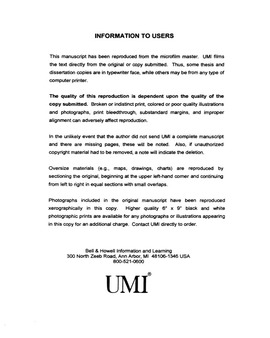| dc.contributor.advisor | Marek, Edmund A., | en_US |
| dc.contributor.author | Mccarty, Robbie Von. | en_US |
| dc.date.accessioned | 2013-08-16T12:18:10Z | |
| dc.date.available | 2013-08-16T12:18:10Z | |
| dc.date.issued | 2001 | en_US |
| dc.identifier.uri | https://hdl.handle.net/11244/301 | |
| dc.description.abstract | Findings indicate all four teachers valued field experiences in personal ways, developed new understandings of scientific practice and content, and anticipated using their new knowledge upon returning to their classrooms with excitement. However, the degree of implementation in classrooms varied according to common aspects of laboratory and classroom contexts. Theoretical literature, notably the Personal Construct Theory of George Kelly, coupled with these findings contributed to emergent theory regarding a hypothetical model for a professional development program of research. | en_US |
| dc.description.abstract | Professional development leading to standards-based teaching practices in U.S. schools is a remarkably subtle and lengthy process. Research indicates that there are many effective tools for teaching through inquiry available to teachers (Lawson, Abraham, & Renner, 1989), but also that teachers continue to present traditional positivistic views of science (Hashweh, 1985; Maor & Taylor, 1995; Zucker, Young, & Luczak, 1996) and appear to view constructivism as a "method" of teaching rather than a way of thinking about learning (Tobin, Tippins, & Gallard, 1984). Teachers are expected to create enriched environments where students can develop the thinking skills of scientists (Roth & Roychoudhury, 1993) but the majority of teachers have never experienced such environments; the involvement of scientists in science education is encouraged by the NRC, AAAS, and NSTA. Teachers and students are expected to act as coresearchers, where negotiation, debate, consensus, and reflection are key. It is believed that scientist and teachers interacting as co-researchers could assist teachers in developing attitudes of freedom in exploration: the essence of science and a mindset that constructivism is a referent, or tool for critical reflection (Tobin, Tippins & Gallard, 1994). This study seeks to identify aspects of scientist-teacher interactions in the field that could serve as catalysts for developing transformational classrooms. | en_US |
| dc.description.abstract | Multiple data sources were collected for this study: audiotapes and transcripts of laboratory interactions and informal interviews, written narratives from applications and funding documents, field notes, and personal communications. Data were simultaneously collected, analyzed and coded as a perpetual review of the literature was conducted as in the grounded theory methodology defined by Glaser (1967) and later by Strauss & Corbin (1990). | en_US |
| dc.format.extent | xii, 171 leaves : | en_US |
| dc.subject | Education, Sciences. | en_US |
| dc.subject | Science Study and teaching (Secondary) | en_US |
| dc.subject | Education, Teacher Training. | en_US |
| dc.subject | Education Experimental methods. | en_US |
| dc.title | Scientist-teacher interactions: Catalysts for developing transformational classrooms. | en_US |
| dc.type | Thesis | en_US |
| dc.thesis.degree | Ph.D. | en_US |
| dc.thesis.degreeDiscipline | Department of Educational Leadership and Policy Studies | en_US |
| dc.note | Adviser: Edmund A. Marek. | en_US |
| dc.note | Source: Dissertation Abstracts International, Volume: 62-02, Section: A, page: 0518. | en_US |
| ou.identifier | (UMI)AAI3004894 | en_US |
| ou.group | Jeannine Rainbolt College of Education::Department of Educational Leadership and Policy Studies | |
